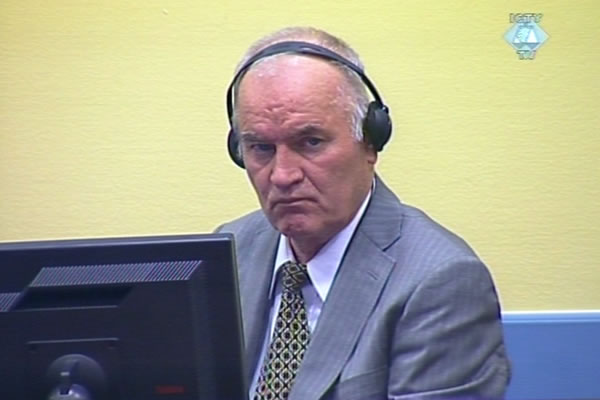Home
TRIAL CHAMBER DECIDES AGAINST SEVERING RATKO MLADIC’S CASE AND REJECTS MLADIC’S APPEAL AGAINST THE FORM OF THE INDICTMENT
The Trial Chamber rejected the prosecution motion to sever the case against Ratko Mladic into two trials, the first for genocide in Srebrenica, followed by the second trial for ethnic cleansing, terror campaign in Sarajevo and hostage-taking. The prosecution’s motion to amend the indictment to include the crime in Bisina was granted. The defense’s interlocutory appeal against the form of the indictment was also rejected
 Ratko Mladic in the courtroom
Ratko Mladic in the courtroom The Trial Chamber rejected the prosecution motion to sever the indictment against Ratko Mladic. The prosecution’s idea was that the former Bosnian Serb army commander would first be tried for genocide in Srebrenica and then for the ethnic cleansing in BH, the terror campaign against civilians in Sarajevo and taking UN members hostage in May and June 1995. At the same time, the judges granted the prosecution’s request to amend the indictment to include the crimes committed in the village of Bisina. Mladic will enter his plea on this charge at the next status conference slated for 10 November 2011.
In its decision made public today, the Trial Chamber noted that severing the case and having two separate trials could ‘prejudice’ the accused and jeopardize his right to ‘personal participation’ in the preparation of his defense. The Trial Chamber found that simultaneous involvement in the pre-trial phase at one trial and in the appellate proceedings for the other trial would ‘unfairly overburden’ the accused and both trials would inevitably proceed at a slower pace.
The Trial Chamber took into account the prosecution’s argument that the second trial might be postponed until the accused has prepared for it. The judges nevertheless noted that this would jeopardize the right of the accused to a ‘trial without delay’. In the case of ‘lengthy’ appeals process, this delay might be ‘significant’, the Trial Chamber noted.
Contrary to the prosecution claims, the Trial Chamber concluded that the trial on the current indictment wouldn’t be ‘unmanageable’; any problems that may crop up wouldn’t be resolved by severing the case. The judges reminded the prosecution that condensing the indictment as it was done in the Radovan Karadzic case remained an option.
Finally, the Trial Chamber found it was ‘less efficient’ to have two trials, because they would require far more time. Some witnesses testifying about the position, powers and conduct of the accused would have to give evidence twice instead of just once, the judges recalled. This would also ‘be an unnecessary burden’ on the witnesses. According to the Trial Chamber, this is ‘a relevant and important factor’ which militated in favor of their decision not to sever the case.
As the judges deliberated on the motion, they did not take into account the health of the accused as the information about his health was not “properly presented’ to the Chamber. The submissions of the parties about Mladic’s health are ‘speculative and unsubstantiated’, the judges said.
Today the Trial Chamber also made public its decision to dismiss Ratko Mladic’s interlocutory appeal alleging defects in the form of the indictment. Mladic’s defense lawyers claimed that the indictment was ‘defective’ because it didn’t specify the identity of the victims and perpetrators of crimes that the accused is charged with. The judges explained that in light of the scope and nature of the crimes and forms of responsibility Mladic is charged with, the indictment was specific enough. The Trial Chamber ordered the prosecution to file a list with identifying information of the victims by 1 November 2011, in order to assist the Defense in preparation of its case.
Linked Reports
- Case : Mladic
- 2011-10-06 SHOULD RATKO MLADIC DEFEND HIMSELF OR SERBIAN NATION?
- 2011-09-13 MLADIC OBJECTS TO “DEFICIENCIES” IN THE INDICTMENT
- 2011-09-01 MLADIC AGAINST SEVERING OF INDICTMENT
- 2011-10-19 PROSECUTION CONSIDERS REDUCING INDICTMENT AGAINST MLADIC
- 2011-11-16 RATKO MLADIC TO UNDERGO MEDICAL CHECKUP
- 2011-11-18 PROPOSAL TO REDUCE MLADIC’S INDICTMENT
